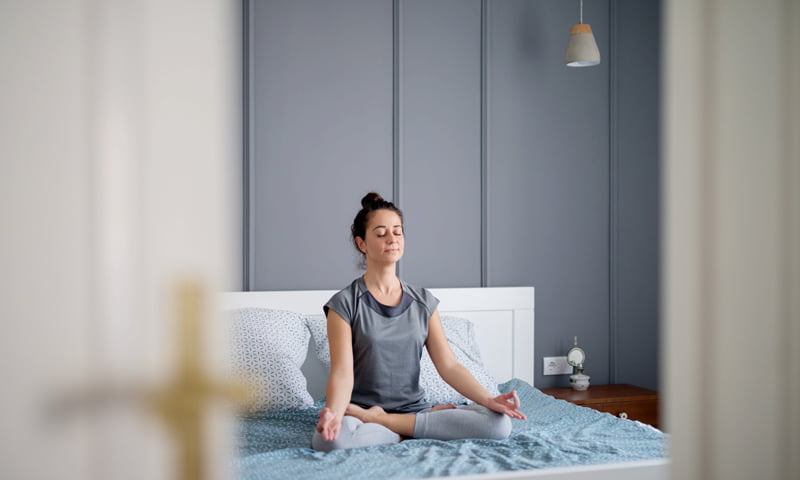How To Meditate Before Bed? A Step-by-step Guide
Do your thoughts and plans for the next day race through your head as you lay in bed at night after turning off the lights? If you struggle with “turning your brain off”, you may find yourself feeling restless and unable to sleep. Fortunately, one strategy for battling insomnia is to practice meditation.
It has been demonstrated that meditation is beneficial for those who experience insomnia and other types of sleep disturbances. However, many people are unaware of how to meditate before bed or the various techniques and methods they can employ.
To meditate before bed: you need to make a preparation, set up the right environment, and choose a meditation method.
Keep reading.
Table of Contents
How To Meditate Before Bed?
Before Meditating: Preparation
You must be ready before you begin to meditate, which means having the appropriate attire, a designated space, and, most importantly, avoiding doing it on an empty stomach. This is especially important if you intend to fall asleep after your meditation because it will be challenging to do so even after you have completed it. Consider some relaxing activities before bed to help you and learn how coffee and anxiety interact.
Make sure there won’t be any sound coming from the location where you’ll meditate. It is advised to draw the blinds, shut the door, put the phone on silent, and meditate properly in complete silence.
Knowing that 10 or 15 minutes will suffice if you are just starting out is crucial. It is not necessary to stay for 4 hours while acting like a Hindu yogi. You’ll be able to lengthen your meditation sessions gradually. Another piece of advice is to look at your meditation posture. First off, if you are not very flexible, you should avoid crossing your legs over one another. It will be sufficient to sit in a relaxed position that does not interfere with our ability to focus while we meditate.
Set A Meditation Routine
There is no justification for not practicing meditation. It only requires a few minutes per day and has numerous positive effects on our health. The first step is to make an effort to incorporate meditation into our daily lives. The goal is to make an effort to schedule meditation time into your day and to try to stick to it. If you miss a day of meditation, it’s okay. Just make sure to practice consistently so it becomes a habit.
Suppose we put too much pressure on ourselves and “force” ourselves to meditate without feeling like it. In that case, the meditation exercise will probably not go well, especially if we are beginners. Since we have forced ourselves to meditate rather than practicing the meditation exercise itself, we are not trained because we will be more concerned with actually meditating. So, set a goal for yourself without putting too much pressure on yourself.
Choose The Right Place To Meditate
Thankfully, there are not many requirements at all. Anywhere that is quiet and free from distracting noises is a suitable place for meditation.
If there are other people in the house, ask them to keep their distance from you while you meditate, turn off the TV and cell phone, and stay away from any other distractions. When you first begin meditating, you can set aside 10 minutes each day, and as you get more comfortable, you can extend that time.
The lotus position is not necessary to achieve. We can lie down, sit on a chair, a special meditation bench, or sit with our knees crossed. Selecting a relaxed position that is comfortable is essential. On the other hand, we can listen to ambient sounds that make it seem as though we are on a beach or in the middle of nature or play special music designed for meditation.
Wear Comfortable Clothes
As long as they are not too tight, we should wear comfortable clothing that allows us to relax our entire body, such as sportswear. You can also carry it out in your comfortable home clothes.
As long as our clothing allows us to be comfortable in any posture we take when meditating, it can be baggy style pants or even sweatpants. Even something as trivial as clothing shouldn’t interfere with our focus while we are meditating.
Set Up The Right Environment
Setting up the ideal environment is the first step in practicing meditation before bed. A distraction-free, serene environment is the ideal setting. To make the process simpler, it might be useful to establish a regular nightly routine.
Here are some tips for creating a relaxing setting:
- Remove distractions.
- Put your recreational electronic devices down, turn off the TV, and make sure the kids are in bed. A quiet, dark, or at least dim environment is necessary for effective meditation.
- Get comfortable.
- Put on whatever makes you most comfortable. Lie down in bed or sit up straight to select a position that minimizes fidgeting and discomfort.
- Prepare your meditation equipment.
- Close all other apps and windows and reduce screen brightness if you’re using your phone or another device to listen to a guided meditation program. When using a white noise machine, set the volume to something you can tolerate. Before beginning, make sure your surroundings are prepared with everything you’ll need in order to keep your time of meditation free from interruptions.
Note: Some people discover that candles are useful for establishing a calming environment. If you want to use candles, make sure to extinguish them before going to bed.
Choose A Meditation Method
To help you relax before bed, there are numerous meditation techniques available. Each of these strategies aims to help you unwind before bed by calming your body and mind.
Finding the method that works best for you might require you to try a few different approaches. Here are a few of the most widely used techniques for sleep meditation.
Guided Meditation
When you practice guided meditation, you tune in to a previously recorded podcast or audio clip that features a guide talking you through the steps. You might receive guidance during a meditation session from a teacher or host who will also explain breathing exercises, relaxation strategies, and other topics. Audio, video, or a combination of the two may be used in them.
For those who find it difficult to maintain mental focus while relaxing, guided meditation may be helpful. For those who need silence to meditate before bed, listening to someone else’s conversation might be annoying.
Mindfulness & Body Scan Meditation
Focusing on the present state of your mind and body is a key component of mindfulness and body scan meditation techniques. Insomnia in older adults can be effectively treated with mindfulness meditation, according to a JAMA study.
Start by closing your eyes, taking a few deep breaths, and paying attention to your breath to practice either of these techniques. Focus on each part of your body in turn, from head to toe or from toe to head, and consider how each feels. What feelings are you noticing, you might wonder. Exists a particular area where you feel tense? Do you frequently find yourself returning to the same subject?
The goal is to acknowledge each thought or sensation, consider how it makes you feel, and then allow yourself to let go of it rather than getting sucked into it. Initially, this might be challenging, but with time and practice, it will get simpler.
Concentration Meditation
Focusing your attention on a particular topic may be helpful if you struggle with mind wandering. Concentration meditation is the name for this technique.
In order to use this technique, choose a topic that will keep your mind occupied. A physical, visual, audible, or mental subject is possible. For example, you might focus on a flickering candle, an audio track of ocean noises, a mantra that you repeat (such as “ohm” or “ah”), or a concept, like the color purple or the idea of love. You can also just concentrate on taking slow, deep breaths.
The objective is not to mentally compose an essay on the subject of your concentration. Just observe what you see and let your mind relax, as in body scan or mindfulness meditation. Recognize when your thoughts stray, then bring your attention back to your breathing and your main subject of focus.
See more about
- How To Solve Your Problems Through Meditation?
- Can You Meditate Lying Down?
- Can You Meditate With Music?
- How Long Should You Meditate For?
Does Meditation Aid In Sleep?
According to a review of 18 studies, people can get better sleep by meditating or setting aside a set amount of time to pay attention to the present moment without judgment. These studies involved a wide range of participants, with some studies concentrating on those who had cancer, fibromyalgia, insomnia, obesity, or high levels of stress.
Older adults’ sleep quality improved after six two-hour sessions of mindfulness meditation. Additionally, a study of individuals with chronic insomnia discovered that practicing a guided meditation with an emphasis on the heart significantly improved sleep, to the point where nearly 88% of participants who were taking sleep medications at the beginning of the study were able to reduce or stop them. Another study of senior citizens found that meditation reduced stress and improved sleep, with the effects lasting six months after the study.
Combining meditation with additional sleep-aid methods may also be beneficial. One study found that combining meditation with cognitive behavioral therapy for insomnia (CBT-I), which is regarded as the gold standard treatment for insomnia, reduced nighttime awakenings more than CBT-I alone.

What Effect Does Sleep Meditation Have?
There could be a variety of causes for why meditation enhances sleep, according to researchers. Stress can be reduced through meditation, which may be especially beneficial for those who have trouble falling asleep due to worry. People who practice mindfulness and meditation are better able to be aware of their thoughts without getting sucked into them, which makes it easier for them to disengage from them long enough to drift off to sleep.
The effects of meditation on reducing pain from fibromyalgia, back pain, migraine, rheumatoid arthritis, irritable bowel syndrome, osteoarthritis, and other disorders have been researched. Since pain frequently interferes with sleep, reducing pain may enhance sleep. A good night’s sleep can help with pain management, which could eventually result in even better sleep.
Even in those who are not experiencing increased stress or pain, meditation may directly improve sleep. Meditation can cause a relaxation response that may help you get ready for sleep whether or not you are experiencing worries. People who meditate also notice changes in their brain chemistry, which last into sleep.
Advantages Of Meditating Before Bed
Let’s see the consequences that learning how to meditate before bed can have, and why it is advisable:
Energize Yourself And Your Attitude In The Morning.
We produce more positive responses when we meditate because it activates reward-related brain regions. We awaken with a better attitude and a much more optimistic perspective as a result of this chemical change in the brain, giving our experiences a greater excellent value. Meditation induces a state of relaxation and calm that releases endorphins, dopamine, and other happy hormones. Therefore, it is not surprising that we view life more positively when we first wake up.
Stimulates Concentration
Our problems and anxieties from the entire day accompany us to bed. This causes us to have thoughts that prevent us from getting any rest. As a result, it is difficult to focus on what we need to do at that time, which is sleep. We exercise our concentration to focus on the tasks we have to complete the following day by meditating before bed. We give ourselves a break so that we can finish the day the following day while managing to concentrate on what needs to be done without additional stress from our minds.
Find Our State Of Peace
We put everything that has come up during the day to bed and think about everything we need to do the following day, as we have already stated, with an eye toward the future. We can observe everything that worries us now by meditating and seeing it less anxiously, allowing us to provide a solution when the time comes. It appears that a state of peace that helps us better control our emotions and be more aware of them is present when we are able to calm our minds. This is an important step to take in order to begin sleeping peacefully and deeply satisfied.
In conclusion, developing a meditation practice before bed offers advantages that help us adopt the mindset we require before bed. a state of serenity, wellbeing, and dedication to our rest and recovery. Because a good night’s sleep affects us in all facets of our lives, it is important to take care of it.
More Restful Sleep
Meditating helps us quiet the noise that our minds frequently make and calm down our bodies. It produces a relaxed state that aids in sound sleep. We can lessen the mental turbulence by breathing and concentrating. Additionally, we’ll lessen the frequency of nightmares, insomnia, and anxiety-related nighttime awakenings.
A more restful night’s sleep entails resting because we need to do so in order to awaken with renewed vigor and strength.
Avoid Cardiovascular Complications
Statistics indicate that mornings are when most heart attacks happen. According to a Medical College of Wisconsin study, those who meditated before bed decreased their risk of having a heart attack by up to 50%. According to the findings, meditation lowers blood pressure and prevents hypertension. Definitely take this seriously.
Disadvantages Of Meditation
There is very little evidence of any negative side effects from meditation, and most people who practice it report positive results. But not everybody who meditates will experience a change. One reason is that there’s a chance meditation won’t be effective for you. There was also one small study done in 2017 that showed a few adverse effects of meditation for some, including experiencing traumatic negative thoughts and hallucinations.
By meditating, you’re allowing your mind to relax, but for some people, that’s not easy, and allowing your mind to relax can invite in potentially dangerous or upsetting thoughts. You might want to consult a doctor before continuing your meditation practice if you have a tendency to think negatively and find that it doesn’t work for you.
Tips For Maximizing The Benefits Of Meditation For Sleep
When you have good sleep habits and are not as likely to have other factors interfere with your sleep, meditation for sleep works best. Try these tips:
- Go to sleep and wake up at the same time every day
- Only use your bed for sleep and sex
- Follow the same routine every night before sleep
- Keep your bedroom cool, dark, and quiet
- Exercise regularly
- Avoid alcohol and caffeine in the hours before sleep
Final Words
For those who struggle with insomnia or poor sleep, meditation is an effective tool. Meditation may help you get a better night’s sleep, though it might take some trial and error to find the right technique.
But not everybody may find meditation effective. Consult a doctor if your insomnia persists or if you discover that meditation is making your symptoms of depression or anxiety worse. There may be a underlying medical issue causing your insomnia that needs to be treated by a qualified professional.
Make an appointment with Dr. if you’ve tried meditation before bed but are still having trouble sleeping. Dr. Kumbkarni is passionate about using meditation and other techniques to treat patients who are experiencing stress and insomnia.
I appreciate you reading, a lot.





